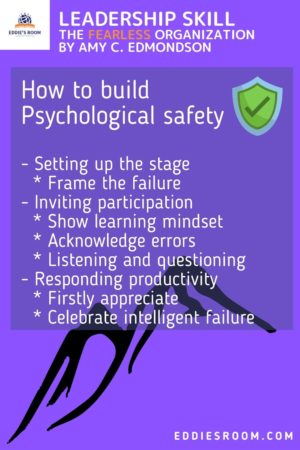The subtitle of this book is Creating Psychological Safety in the Workplace for Learning, Innovation, and Growth.
We can learn what is Psychological safety and why it is so important And then we can learn how to build the learning environment for our growth and performance based on Psychological safety.
What is Psychological safety?
Psychological safety is a belief that one will not be punished or humiliated for speaking up with ideas, questions, concerns, or mistakes.
Better teams make more mistakes
The interesting finding is that the more successful teams report more mistakes. As the author suggested, this result is the opposite of my guess.
A good team often makes mistakes because they can speak openly about anything. On the other hand, teams that do not achieve results do not report mistakes because they are concerned about the fear and lack of confidence.
So better teams share mistakes and learn from them. But if we hide mistakes, we lost the opportunity to learn and grow.
Don’t use the power of fear to motivate
The problem here is the fear that prevents team members from expressing their opinion. However, the author described that many managers believe the power of fear can be used to have better performance.
The author introduces one research that if we feel fear, we have to use the part of the brain that manages working memory and processes new information.
Therefore our capability of analytic thinking, creative insights, and problem-solving decrease. So in order to use the full resource of our brain, we have to avoid feeling fear.
Don’t be silent for your team
When we speak up, we may prevent a failure. So there is a possibility that our organization or our customer may have a benefit. After an incident happens, those who fail to speak up often report regret or pain. What is the benefit of being silent?
When they speak up, they are afraid of damaging relationships, losing jobs. We know “No one was ever fired for silence.”
As you can easily imagine, you have to be brave when you say something to an authority such as a doctor, professor, or boss. Obviously, there is a risk so this is the reason why we should be silent.
Don’t make fear culture
Leaders who listen only to the good news create a fear culture and the truth has been never reported.
And NASA engineers expressed concern to their boss, but it wasn’t taken seriously, leading to a tragic accident.
Other examples of VW, Wells-Fargo, Nokia, and Fukushima are described in this book. It is interesting to me and worth checking to understand how fear culture impacts the performance of an organization.
How to build Psychological safety
Setting up the stage
Reframing Failure such as Preventive, Complex, Intelligent and welcome failure. Intelligent failure must be celebrated because of the big potential to learn and grow.
Inviting participation
Leaders who show a learning mindset reduce the risk of interpersonal relationships when their subordinates speak.
And acknowledge leaders’ errors and shortcomings can create an environment where team members can easily express their opinions. Conversely, if the leader is perfect, the hurdles for team members to give their opinions are high.
Also listening and questioning are tools to draw the opinion from a team member. Please check about listening skills.
Responding productivity
The first response must be appreciation regardless the opinion is good or bad.
My favorite part of this book is the table of “Destigmatizing Failure for Psychological Safety” which makes me redefine failures.
| Traditional Frame | Destigmatizing Reframe | |
| Concept of Failure | Failure is not acceptable. | Failure is a natural by-product of experimentation. |
| Beliefs about effective performance | Effective performers don’t fail. | Effective performers learn and share the lessons from failures. |
| The Goal | Prevent failure | Promote fast learning |
| The Frames’ impact | People hide failures to protect themselves. | Open discussion, fast learning, and innovation |
In fact, a productive response to intelligent failure can mean actually celebrating the news.
I would like to introduce the following TED talk for your reference.
Thank you for reading this post.
“The fearless organization” is the best book to learn what is Psychological Safety and how it works for our working environment and how we can create it.
Please check the author’s page at Harvard Business School.


